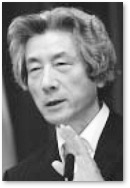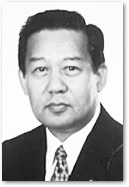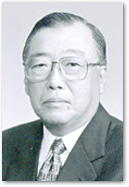- H.E. Mr. Abdirashid Dulane , Ambassador of Ethiopia to Japan
- H.E. Mr. Junichiro Koizumi , Former Prime Minister of Japan
- H.E. Mr. Toshihiro Nikai
Member of the House of Representatives, Liberal Democratic Party Diet Affairs
Committee Chairman - Dr. Sadao Umeda , President of The Ethiopian Association of Japan
Ethiopia ensuring a path of sustainable development
H.E. Mr. Abdirashid Dulane Ambassador of Ethiopia to Japan

H.E. Mr. Abdirashid Dulane
Ambassador of Ethiopia to
Japan
Since the demise of the dictatorial Derg regime, Ethiopia has embarked on a road to peace, democracy and development. Conducive policies for poverty reduction and sustainable development have been put in place. Remarkable improvements in education, health and water supply coverage have been recorded. Road density, electric supply and telecommunications in rural and urban areas are showing significant growth.
In education, attainment of the U.N. Millennium Development Goal target will become a reality soon. Sustaining the impressive successive growth of the past four years would undoubtedly give us a boost to accelerate the attainment of universal access and coverage in water supply, health, electricity and other sectors.
Ethiopia and Japan have enjoyed more than a half-century of official bilateral relations. This warm and cordial relationship is based on mutual interest and respect, and is continuously improving. Japan is a major economic partner with Ethiopia, providing tangible development assistance in education, health, infrastructure, food production, security and water resources. Assistance in these vital human security and poverty-reduction areas is changing the lives of many in our society for the better.
Japan is one of our major trading partners. Mocha coffee is a favorite drink for most Japanese. Last year, Japan imported 20 percent of our global coffee exports, second only to Germany. Currently, a joint effort is being carried out between a Japanese company and an Ethiopian exporter to install a coffee roasting and packing machine to add value to our coffee export business. We expect this to be achieved before the end of the year. Ethiopia also produces a large quantity of sesame seeds. Value-adding business opportunities in extraction and bottling of sesame oil are available to investors.
Ethiopian flowers are also becoming an important export attraction in Japan. Last year, thanks to JETRO, Ethiopian flowers were displayed at IFEX 2006 with other East African flowers. The JETRO project evaluation, the feedback from numerous importers and florists we met confirmed the high quality of our roses.
Several flower companies were able to travel to Ethiopia to participate in the Flower Fair held in Addis Ababa this March and visit farms, and some of them have started importing flowers while others are making preparations to import our flowers to Japan in the coming months. Considering that the first exports of our flowers happened in the last quarter of last year, the progress in the first quarter of this year (1.4 million stems) is encouraging.
Investment in floriculture is expanding and booming. There are attractive incentives for investors, including exemption from taxes and customs duties on raw materials for production and other capital goods, and relevant tax holidays. Seeing is believing, as the saying goes. Visit us and join the numerous local and foreign investors who have and are benefiting from these generous incentives.
On the cultural front, the embassy’s Mocha Dance Group has entertained thousands of Japanese spectators at exhibitions, bazaars and other occasions that have helped to introduce to Japan the rich and diverse dances of our nations, nationalities and peoples.
Our traditional coffee ceremony is becoming popular in Japan. Businesses, tour agencies and educational institutions are getting a glimpse of this unique ceremony.
In April, the first International Symposium on the Cultural Heritage of Ethiopia (which was part of our millennium celebration activities) was held at the Architectural Institute of Japan. The event, co-organized by our embassy, the Executive Committee for Cultural Heritage in Ethiopia and Nikkei Inc., attracted dignitaries, officials of the World Heritage Cities of Gondar and Harar, decision-makers, professors from Ethiopian and Japanese universities, and students.
Real-time experiences on the conservation of cultural heritages were shared. The establishment of a collaborative relationship between Keio University and Makelle University in this field is commendable and needs strengthening.
This year by Sept. 12, we will be celebrating the beginning of our Third Millennium. Thousands of people from all over the world will be converging on Addis Ababa, our capital, and other parts of the country to celebrate, witness and relive the spirit of a second new millennium in their lifetime — a treat exclusive to Ethiopia. Besides appreciating the magnificent and unparalleled historical, natural and cultural attractions, observing the colorful and picturesque millennium celebration event could be a lifetime experience.
Therefore on this festive occasion, I call upon Japanese tourists and other travelers to book their flights early not to miss this chance of a lifetime.
On this important day, I want to admire and laud the commendable role played by the Japan-Ethiopia Parliamentary Friendship League, Ethiopia Association of Japan, Mocha Dance Group, ex-JOCV members to Ethiopia, other friends of Ethiopia and my compatriots in the Ethiopian community of Japan in strengthening the relationship between the two countries and their peoples.
Consequently, I would like to take this opportunity to thank The Japan Times for giving me this opportunity to address its esteemed readers, and the sponsors of this special page — Ethiopian Airlines, Wataru & Co., Eagle Shipping Japan Ltd. and UNICAFE Inc. Finally, I wish our people a happy, steady, peaceful and prosperousThird Millennium.
Warm memories of Ethiopia
H.E. Mr. Junichiro Koizumi Former Prime Minister of Japan

H.E. Mr. Junichiro Koizumi
Former Prime Minister of
Japan
A little more than a year has passed since I made an official visit to the Federal Democratic Republic of Ethiopia as Prime Minister of Japan.
I had excellent meetings with Prime Minister Meles Zenawi as well as the leaders of the African Union, and the visit proved most fruitful and enjoyable. I would like to reiterate my sincere gratitude to the government and the people of Ethiopia for their heartwarming welcome.
I learned that the name of the capital city, Addis Ababa, means ‘‘new flower.’’ The city was indeed like a pretty flower that has bloomed in a scenic highland.
In the garden of the National Palace that Their Majesties the Emperor and Empress visited during their official visit in 1960, I enjoyed coffee in the traditional Ethiopian manner, which has some similarities to the traditional Japanese tea ceremony. It was a great joy to savor the real taste of coffee in such an environment. Also within the palace, I saw the Ethiopian black lions and felt the strong symbol of dignity of Ethiopia, which has maintained independence throughout its long history.
In closing, I wish the people of Ethiopia long-lasting peace and prosperity for the Third Millennium according to the Ethiopian Coptic Calendar, which starts Sept. 12.
Bilateral friendship has potential for worldwide influence
H.E. Mr. Toshihiro Nikai Member of the House of Representatives Liberal Democratic Party Diet Affairs Committee Chairman

H.E. Mr. Toshihiro Nikai
Member of the House of Representatives
Liberal Democratic Party Diet Affairs
Committee Chairman
Beginning with the legend of King Solomon, which has its beginnings in the Old Testament, to the appearance of the Queen of Sheba, Ethiopia’s independent-minded culture and history has captured the imaginations of countless people for over 3,000 years.
Furthermore, as the Japanese have a similar tradition of pride and cultural unity, which has maintained continued independence throughout history, the result is that many Japanese people cannot hide their deep sense of respect for Ethiopia.
In the Japanese mind, the first remembrance of this familiar sense of pride occurred during the track and field events of the 1964 Tokyo Olympics. The Ethiopian team achieved glory and respect with competitors such as Mesereto Dehuaru, who won the gold medal in the women’s 5,000 meters, and Abebe Bikila, winner of the Olympic marathon. Both athletes showed unsurpassed Olympic excellence.
During that period in his life, Bikila earned much admiration that did not diminish at his death, and the image of that brave figure has been etched in the consciousness of many Japanese as an eternal Ethiopian hero.
Japan’s first bonds with Ethiopia were forged in 1927 with the conclusion of the Treaty of Friendship, marking the beginning of peaceable relations between the two countries. This year marks the 80th anniversary of that treaty, truly a time for commemoration and remembrance. The relationship between Japan and Ethiopia is intact, despite a short discontinuance during World War II. The 80-year friendship has proven a fortunate experience for both countries.
Ethiopian Emperor Haile Selassie visited Japan in 1956, thereby cementing a deep bond of friendship between the two countries. In addition, Their Majesties, the Emperor and Empress led a royal delegation to Ethiopia in 1960, further tying together the two countries.
The links between Japanese and Ethiopians run deep, with a long history of friendship, but as the 21st century progresses, a time has come when both countries need to redefine their cooperative relationship. Recently Japan, in order to realize its full economic potential and to have its contributions recognized by the international community, needs to ensure that these contributions are used in peaceful development for all mankind and has the assured cooperation of those international societies.
Japan’s relations with the countries in the African Union, which are blessed with rich natural resources, hold an equally rich and important future. Ethiopia is a member of the AU, and the capital is Addis Ababa, or ‘‘new flower,’’ which functions as an especially important symbol in the AU, acting as a leader for these African countries to emulate.
When I visited Ethiopia in 1985, I experienced and witnessed a nation having difficulty in effectively eliminating the suffering of the country’s refugees. After that visit, Japan’s and Ethiopia’s names were linked in such a fashion that the bond between the nations would help push Ethiopia to new stages of opportunity, which I did notice happening on a second visit to that country.
The scenery may change every time you visit, but when you see a place, constantly modernizing and progressing, one cannot but help gasp in admiration and feel respect for a country that possesses such a palpable, powerful essence, and you witness before you a land of unlimited possibility.
Prime Minister Junichiro Koizumi visited the Ethiopian capital in 2006, a first for a Japanese leader, and met Prime Minister Meles Zenwai to discuss mutual cooperation. One point of importance discussed was not to allow the hindrances of the past century to impinge on the 21st century. The boundaries created by race and religion must be cast aside to perpetuate a continuing maturation of the Japanese Ethiopian bond, uniting and striving for a platform of agreement on such issues as energy and the environment. This agreement will not only foster a stronger relationship of friendship, which is already warm between these two countries, but a friendship that is not only mutually beneficial, but one that benefits all of mankind. An old expression of ‘‘seeing is believing’’ prevails in Asian culture.
Firsthand observations of the physical presentations of history, combined with sharing traditional cultures, allow a warm, mutual understanding to develop between two nations. More importantly, for the citizens of these countries, such a valuable experience is indeed a rare occurrence and the experience is difficult to replace or emulate. This sensation was born between myself and Ethiopia during my first visit in 1985, and can be experienced by all the citizens of both countries sharing with one another.
Visiting a similar country leads to mutual contact and the opportunity for understanding is increased. Moreover, this shared contact bridges the hearts, affections and thoughts of peoples living on different sides of the globe. Asia and Africa are showing that the path of intimate friendship is truly a beneficial course for nations to endeavor upon.
Japan’s and Ethiopia’s friendship-related development shows the world a positive display of understanding and respect, and is warmly embraced by both these nations, marking this 16th National Day for Ethiopia a day for celebration.
Grass-roots exchanges bolster ties
Dr. Sadao Umeda President of The Ethiopian Association of Japan.

Dr. Sadao Umeda
President of The Ethiopian Association of Japan.
With a 36 year history, our Association has promoted people to people exchanges aiming for the betterment of the bilateral relations as well as world peace. Members who love Ethiopia have kept developing goodwill activities, such as scholarship program, fundraising for flood victims who were attacked last summer in the Eastern and Southern part of Ethiopia, and cultural, academic and economic exchanges through active human network.
As for the scholarship program, we have supported 45 university students studying in Ethiopia to date since we started the scheme in 2001. Many students have shown their sincere appreciation to us by graduating with distinction and being awarded a medal for standing first in each faculty. When our representatives visited Ethiopia this February, they were happy to have a luncheon meeting and exchange views with those scholarship students with the presence of H.E. Mr. Kinichi Komano, Japanese Ambassador to Ethiopia, H.E. Mr. Mahdi Ahmed Gadid, Director General of Asia, Australasia of Ministry of Foreign Affairs in Ethiopia and the Association’s local members. Nearly 30 people gathered in total. Our small but hearty financial supports were found to make the students feel that there is somebody who lives miles and miles away, cares about their dreams and shares their views with. It is our wish that these educated youth will assume leadership roles in Ethiopia in the future, settling its poverty in the first place.
Academic exchanges are setting the pace among universities, too. The University of Tokushima in Shikoku and Gondar University in Ethiopia are going to conclude an academic agreement soon on joint research in the fields of Health Bioscience such as Micronutrients and HIV / tuberculosis and Socio-techno-science, like environmental analysis. Keio University has long been engaged in restoration of wall pictures at hidden rock churches in Tigray, the Northern part of Ethiopia and also in helping city plan at other regions of Ethiopia. Having much enlightened local universities, their works resulted in opening classes there to study the same architecture of Ethiopia as Keio University pursues by sending their lecturers from Japan. Our Association is supporting their academic activities as much as possible.
It was encouraging to witness that “Ethiopian Night for Cuisine and Dance”, our popular annual event, held last October also celebrating its 35th anniversary, attracted as many as 400 participants. Programs of the evening covered cultural exchanges of colorful traditions of both countries, such as Ethiopian cuisine, coffee ceremony and Ethiopian dance on their part and Japanese dance, Koto (instrument) play and exciting Karate performance on our part. On this festive occasion, a certificate of commendation was awarded to 6 corporate members and 48 individual members who supported our Association for 10 to 33 years long to the success.
Last year, we had two ministers from Ethiopia. They were H.E. Mr. Girma Birr Geda, Minister of Trade and Industry and H.E. Dr. Tekeda Alemu, State Minister of Foreign Affairs. We hosted a welcome dinner respectively and enjoyed talks. We are delighted that the two country relationship has been deepened and getting stronger every year through these people to people valuable exchanges.
We hope to see the further development of Ethiopia through the strong ties. I sincerely wish Ethiopia every success in its quest for prosperity and stability.

